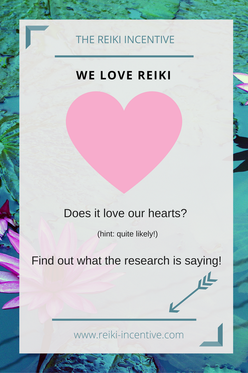
We've seen that psychologically, Reiki seems to reduce our feelings of anxiety and stress. But there is less research which measures our physiological response to the therapy. Perhaps common sense and an understanding that the mind and the body are intimately interconnected might already tell us that if we feel psychologically better then there must, by definition, be some positive physiological changes taking place as well. Well, here is some Reiki research as food for thought... 2008 (1) Knowing that Reiki had been shown to lower heart rate and blood pressure in a small group of people, scientists in the US decided to research this benefit using laboratory rats. Whatever your feeling about the use of lab rats, it is true to say that using them to test a treatment such as Reiki does have some real advantages. When we study Reiki in humans, it is a challenge to determine and measure the true effect of Reiki and differentiate that effect that from the real and positive effects which come from having any treatment, often caused by a positive expectation of having the treatment, the time and attention of the therapist etc. These are non-specific effects sometimes referred to as placebo effects. Critics of Reiki can be quick to dismiss any benefits Reiki may offer as “just placebo”, but more on this in a future post. For now, back to our lab rats.. Scientists from the University of Arizona, having access to laboratory facilities, compared the effectiveness of both Reiki and sham/pretend Reiki in reducing the heart rate and blood pressure of stressed rats. Three unrestrained rats, fitted with humane and highly accurate monitoring devices were exposed to 15 minutes of white noise daily for 8 days. This was something that had been shown previously to increase their heart rate and blood pressure. For the last five days of this regime, the rats received 15 minutes of Reiki before and during this exposure. This was conducted again, on the same rats, using pretend Reiki. What the scientists found was that real Reiki (but not pretend Reiki) was effective in reducing the heart rates of pre-stressed rats. Those rats with the highest heart rates showed a greater reduction in heart rate, pointing towards a homoeostatic effect. When the rats were treated with Reiki both before and during the noise they showed no increase in heart rate as a result of the noise. In other words, they found that Reiki had a modulating homoeostatic effect. They concluded that these results supported the use of Reiki as a stress reducing therapy for humans. Neither Reiki or sham Reiki significantly affected blood pressure however. This was a small study which used a short duration of Reiki treatment. Like all research, its results pose as many questions as they answer. It is safe to conclude that the findings support further study into this area. (For reassurance, the rats were housed well, in an interesting and playful environment, with fellow rats for company and with access to fresh food and water as desired. They had a dedicated animal caretaker and all procedures were overseen by the University’s animal care committee.) 2010 (2) Research reported in the American Journal of Cardiology: Clinical researchers from the Cardiology Department at Yale University studied the effect of Reiki on heart rate variability (HRV). HRV is the variation in the time taken between each heartbeat. It is a small measurement of the difference in time taken from one beat to the next. Variations are normal and a high variability is a good indicator of health. Stress, anxiety and poor health can lead to low variability which can indicate cardiac risk. Following heart attack, a low heart rate variability can predict a poor outcome. For this reason, the clinicians at Yale decided to test whether Reiki would improve the heart rate variability of their in-patients recovering from Acute Coronary Syndrome (ACS – a medical emergency where blood to the heart is stopped or reduced, perhaps due to heart attack or similar disorder). They conducted a randomised controlled trial which compared the effects of Reiki, Rest and Relaxing Music on HRV. 12 people were randomised to receive Reiki, 12 to continue to rest and 13 to listen to restful music. It was found that average HRV improved significantly from baseline in the Reiki group, an effect not seen in the other two groups. The research also found that the Reiki group saw greater improvements in self-reported positive emotions and reductions in stress, frustration, fear and anxiety than those in the other groups. This was only a small trial, however the clinicians concluded that further research is needed to evaluate Reiki as a potential long-term approach to improving prognosis following ACS. 2014 (3) A larger trial conducted in Brazil which compared Reiki, sham Reiki and rest showed that real Reiki lowered problematic high blood pressure more than sham Reiki or rest. The effect shown by Reiki was both clinically and statistically significant. It is interesting to note that both the above clinical trials showed Reiki to be superior to sham or placebo Reiki. If you would like to know more about Reiki research sign up for my occasional newsletter using the box below. When I post something new I'll let you know.
References:
1. Baldwin, A.L., Wagers, C. Schwartz, G.E. (2008) Reiki Improves Heart Rate Homeostasis in Laboratory Rats. The Journal of Alternative and Complementary Medicine. 14 (4) 417 – 422. 2. Friedman, R.S.C. (et. al.) (2010) Effects of Reiki on Autonomic Activity Early After Acute Coronary Syndrome. Journal of the American College of Cardiology. 56 (12) 995 – 999. 3. Salles, L.F. et. al. (2014) The effect of Reiki on blood hypertension. Acta Paul Enferm. 27 (5) 479 – 84.
1 Comment
8/12/2022 01:46:33 am
I find it fascinating that a reiki session could help you recover from stress and clears your mind! My friend is looking for ideas on how to spend his week-long vacation after tackling a huge work project. Maybe we should find a practitioner that'll let her try this out.
Reply
Leave a Reply. |
Author
Angela established the Reiki Incentive for Reiki practitioners who want to see Reiki more widely accepted and to see it reach new people. She enjoys sharing her passion for authentic practice as well as research into the benefits of this wonderful therapy. Archives
May 2018
Categories
All
|

 RSS Feed
RSS Feed
